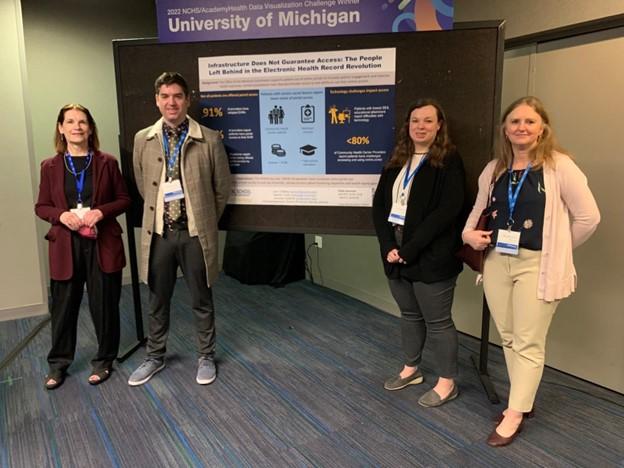
We are Ph.D. students with shared interests in health information infrastructure, and how this infrastructure can improve both access to and quality of healthcare. The 2022 National Center for Health Statistics (NCHS)/AcademyHealth Data Visualization Challenge was a great opportunity to explore patient access to their electronic health records (EHR). We were particularly interested in a) the relationship between EHR availability and patients’ self-reported access and invitations to access their records, and b) how social determinants of health may impact patients’ access to their electronic health information.
Our research
Federal policy has successfully incentivized provider adoption of EHRs, notably through the 2009 Health Information Technology for Economic and Clinical Heath (HITECH) Act. However, while most providers now utilize digital health information infrastructure (physician adoption of EHRs grew from 22 percent in 2009 to 79 percent in 2014), patient engagement and uptake has not matched these trends. The least advantaged Americans are less likely to be offered access to their electronic medical records and more likely to report challenges in doing so.
To examine disparities between availability and access, we used two publicly available national datasets: the National Electronic Records Survey (NEHRS) and the Health Information National Trends Survey (HINTS). We selected these datasets as they provided unique perspectives about electronic health records and portal access through a patient and provider lens. HINTS shows us the patient perspective, where we examine differences in health information technology use and attitudes by income, education, and Medicaid status. NEHRS lets us examine trends from the doctor's perspective, breaking out outcomes by practice characteristics. While the respondents represented in these datasets are not connected, we were interested to see if there were significant differences between provider and patient experience.
The Challenge requirement to integrate at least two unrelated datasets was a valuable learning experience. First, the availability of variables depended on the survey year, requiring us to use different years in different charts. For example, the 2021 NERHS sample did not collect whether practices enabled patient access to records; only the 2021 NEHRS sample included telemedicine responses. Additionally, raw NEHRS data were not available prior to 2018 so to produce trend data we turned to pre-aggregated tables from the HealthIT.gov data brief: National Trends in Hospital and Physician Adoption of Electronic Health Records.
We used Tableau Public to present our findings in an interactive Tableau notebook. The notebook provides access to the underlying data and summarizes our main findings:
- Physician adoption of certified EHRs has become near-universal
- Almost all physicians have adopted some form of EHRs. However, many patients are not offered access to these records, especially in populations comprised primarily of patients with Medicaid
- The lower a respondent’s educational attainment or income, the more likely they are to report never accessing their EHR or never being offered access by a provider
- Technological challenges to EHR access are common among respondents with lower socioeconomic status
- Almost all physicians at Community Health Centers report practicing telemedicine, and are also the most likely settings to report patient difficulties accessing and using the portal
Our conference experience
As winners of the 2022 NCHS/Academy Health Visualization Challenge, we were awarded free conference registration to the 2023 Health Datapalooza and invited to present our research in a poster session. Our poster, “Infrastructure does not guarantee access: The people left behind in the EHR revolution” was presented as a visual abstract to efficiently summarize three main findings and the main implication of our findings: HITECH and the COVID-19 pandemic increased online portal use. However, the uneven access to and use of these portals raises concerns about increasing disparities and health equity gaps. While the visual abstract format is a bit unconventional, this design turned out to be a great way to stimulate both interest in our work and many interesting conversations with other conference attendees.
We had an exceptional time at Health Datapalooza, sharing our research findings and networking with other graduate students, patients, and experts in the healthcare field. We connected with other health researchers and led a group of new friends to a dinner in Dupont Circle. The conference also gave us the opportunity to attend numerous interesting presentations on emerging health information topics. Uncertainty around compliance requirements in the Cures Act or the impact of the Dobbs decision made these information sessions especially helpful as we try to understand impacts on patient privacy and access to their own health data. Talks on unlocking health information exchanges to help marginalized communities linked to our own presentation topic and encouraged us to continue our research. And the panel discussions about ethics and transparency around patient health prediction models have only become more relevant as health systems embraces artificial intelligence. In a rapidly changing health IT landscape, it’s great to hear from leaders on where we think we’re all headed.